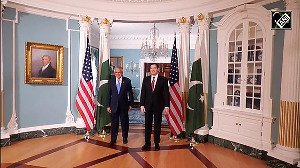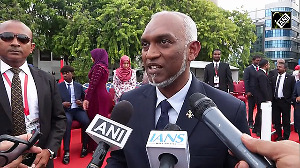India regards Pervez Musharraf as an "elected President" of Pakistan and a "credible interlocutor" with whom it will continue to do business, says National Security Adviser M K Narayanan.
Narayanan, in an interview to Karan Thapar on CNN-IBN's programme Devil's Advocate, spoke of a "grudging respect" for the manner in which Musharraf has managed to overcome his previous struggles.
"He's moved from a military president to a civilian president. He's managed to see there is no boycott to the election to the Assembly. To some extent, he has managed to ride (it out). At least definitely in the short term it should be possible (for him to succeed)," Narayanan said.
Narayanan, who responded to questions on the turmoil in Pakistan and its implications for India, said, "I think as of now he (Musharraf) is an elected President but the legitimacy of his presidentship will have to be declared properly after the new Parliament approves of it with a two-thirds majority."
The national security adviser saw this as a clear possibility.
"As things stand, it does seem possible he will be ratified with that majority. We have done business with him in the past and I think we will continue to do business with him," he said.
On whether Musharraf remains a credible interlocutor for India, he said, "Yes, by and large, he will remain a credible interlocutor to that extent."
Narayanan felt that in the longer term, Musharraf's future depended on the Army standing united as well as loyal to him.
"As of now I don't see any signs of cracks in the system," he said, observing, "if you take the corp commanders and generals, they are all on the same wavelength. When ambition emerges, it may be different."
Noting that Musharraf has put all his loyalists in key positions in the Army, Narayanan said if it remains united knowing there is a lot to gain by way of privileges and perks, it may be willing to back a civilian president.
He alluded to other similar transitions from military to civilian rule around West Asia which had lasted for two decades and more. He said it was "not improbable" that the transition in Pakistan could be similar.
Asked how much power Musharraf has lost by doffing his uniform, Narayanan spoke of the three-way split in power between the civilian President, the Army Chief and the new prime minister which the President will have to contend with.
Narayanan described new Army Chief Ashfaq Kayani, a former ISI chief, as a "professional soldier" who is a "close comrade" of Musharraf.
Therefore, he was of the view that the relationship between Musharraf and Kayani will remain cordial.
"How long is a matter (of conjecture)...the basic point is how does a civilian President play out in Pakistan when the Army is still the dominant force? This is something, we will have to look at closely," he said.
He did not see General Kayani indulging in an "adventurous action" against India. "He's too professional a soldier to attempt it".
Narayanan said General Kayani was not a man with great political ambitions.
"The soldiers who know him think he's a loyal individual."
Narayanan sought to draw a distinction between Kayani and one of his predecessors Hamid Gul, who was best known for his belief that India should be made to bleed by a thousand cuts.
"I don't think ISI has changed under Kayani one way or the other. There was possibly a tactical restraint, imposed from outside, possibly by President Musharraf."
He felt that in terms of the larger issue of mentoring outfits like Lashkar-e-Toiba, Jaish-e-Mohammad and Al Badr, there was no fundamental change.
About the elections slated to be held early January, Narayanan said conventional wisdom seems to be that no single party is going to get a majority.
On whether India would welcome Benazir Bhutto as prime minister who has in a spate of interviews committed herself to closing down terror camps and curbing private militias in Pakistan, he questioned whether she could deliver on her promise although he hoped she would.






